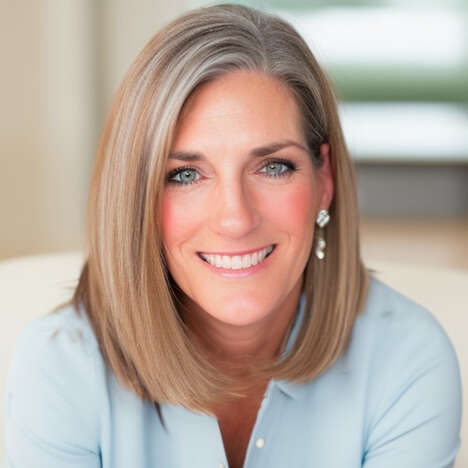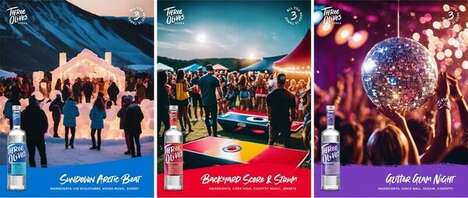Crafting Memorable Experiences
An Interview with Marsha Flanagan, CEO International Association of Exhibitions & Events (IAEE)
 Marsha Flanagan is the dynamic President and CEO of the International Association of Exhibitions and Events (IAEE), a prominent US-based trade association. With a mission to globally champion the value of trade shows, IAEE boasts 1200 company members and 10,000 individual members. Marsha is an advocate for innovation, believing it is the driving force behind relevance and success, both personally and within her industry.
Marsha Flanagan is the dynamic President and CEO of the International Association of Exhibitions and Events (IAEE), a prominent US-based trade association. With a mission to globally champion the value of trade shows, IAEE boasts 1200 company members and 10,000 individual members. Marsha is an advocate for innovation, believing it is the driving force behind relevance and success, both personally and within her industry.1. Tell us your name and about your role at the International Association of Exhibitions and Events?
My name is Marsha Flanagan, and I am the president and CEO of the International Association of Exhibitions and Events or IAEE. We are a trade association that is based in the US, and our sole purpose, and mission is to promote the value of trade shows and exhibitions globally. And we have about 1200 or so company members and about 10,000 individual members worldwide. We represent both the B2B marketplace and B2C marketplace of those who either produce trade shows and events, or those who supply services for trade shows and events. So organizers such as Trend Hunter, and also the suppliers and vendors that you use to produce your shows as well.
2. What does innovation mean to you?
To me, innovation really means everything. It means being able to stay relevant to your members, to your key stakeholders, your board members, since it’s what drives new ideas and business forward. It's such an important word for me, and it's something that I really try to embed into the way I think on a daily basis. It's what keeps me up at night – it gives me pain, and it gives me pleasure. Innovation is something I strive for, both personally and within our work and our industry. If any company doesn't innovate consistently, they won't stay relevant, they won't stay around, they won't stay in business, and it's vitally important.
3. How does your team generate new ideas?
Our team generates new ideas by really taking a look at many different industries and what they are doing. We then try to take the ideas and the work to see how those apply to our industry.
Working in the association world, we’re an association with members and a governance structure. Sometimes things can move a bit slower than with those without a governance structure. So working smarter and not harder is really key on the association side. And I think that's where innovation comes into play. That's where taking best practices outside our industry is really important.
I've learned through a lot of reading of even Trend Hunter content that it's important to take a look at other industries for ideas. And sometimes it's hard for your team to think about how that transcends over, but for those leaders that get it and can do it, it's really exciting.
I encourage our team to read things from outside our industry. A, you have to stay on top of what's going on in our industry, B, you look at other industries, and C, don't be afraid to take a risk. That's where I think some people like to play it really safe, and it's okay to take a risk because failure is when you can learn to succeed. Because of that, I would rather have a team go out there and make a mistake any day, rather than to be afraid to even move forward.
4. Has there ever been an instance where another industry has influenced a specific innovation at your company?
Well, I think as it relates to event design, specifically the trade show floor and the way that people purchase and maneuver through a consumer focused situation, we have looked at retail environments. I think retail plays a big part in what we do. We also look at consumer buying habits and even the neuroscience behind why people attend an event, and at what would trigger them to be engaged. So on the science side of design and neuroscience, that's another area that we look at. I would say retail neuroscience as it relates to our team and the marketing aspects of customer centricity.
5. Do you have any specific rituals for resetting your team to be creative?
I'm kind of new in my role as president and CEO but we have our first leadership strategy retreat coming up in a couple of weeks, so it's my first time to do this in that role. I can say with other teams I've been a part of, collaboration is key. I think meeting consistently, having open and honest conversations, not squashing new ideas and really listening as a leader is really important.
Everyone really excels when they feel they're on the same playing level, so I think titles kind of go out the window for me when it comes to putting groups together. In fact, in our women's leadership forum that we host, we don't even put titles on our name badges because we want everyone to feel as though they're coming together equally as women to discuss whatever the topic of the day may be. When we're putting together internal teams, I don't want a coordinator to feel like they can't speak up. As my dad always told me, you're only as great as the weakest player on your team so everyone needs to be equal and speak up.
6. How do you identify trends and what resources does your team use to spot trends and consumer insights?
We definitely use Trend Hunter, and I've been following Trend Hunter since I can remember when Jeremy first launched it. We also look at the Harris Poll for insights. We look at our own industry publications and what other groups are doing. Of course, we always do a SWOT analysis like any other group. So we're looking at competitors, we're looking at collaborators that we have lots of different partnerships with.
I would say I just try to read as many business blogs as possible, anything from Harvard Business Review to Fast Company to a lot of marketing. I think marketing really helps us talk about events and customer centricity. But like I said, neuroscience has been a big one lately as well as design.
My background is in education and art, and so I think having that conceptual brain drives my team a little crazy because they're very logistical in nature and they have to make it happen. So I can come up with these ideas, but then they have to make it happen, but that's the beauty of knowing who's on your team and how we all work together and how we can actually come up with a conceptual idea and make it happen.
7. What makes an innovative culture and how do you create a culture of innovation?
A sense of belonging and purpose is important. So if you don't feel like you belong or you don't feel like there's a sense of purpose, it's going to be hard to motivate those people to stay engaged. So that's number one, and number two is to build that trust. With our team, we do a number of assessments, whether it be personality assessments, anything traditional from a disc assessment, all the way through the Trend Hunter assessments that we do. The fun of it is that anytime we can come together and we go over those results with each other, it just helps us reinforce who's stronger at something, who's not as strong, which doesn't mean you're weak, but that it's just not your area of strength.
If we can learn to play off each other as far as who's stronger and who has the strengths in certain areas, it helps with this level of trust. When we know that so-and-so is better at that doesn't mean you're worse at it or whatever. It's just helpful to have that level of insights about your team. It's like being a coach of the team, right? Who's a better forward versus a better defender. I feel like I'm that coach of that team where I can pull those personalities together to make everyone feel like they belong with the purpose while contributing and doing it well.
8. What is the biggest challenge you face when innovating?
The biggest challenge I face is just the amount of time it takes to be innovative. A lot of times you need to move quickly, and there may not be the ability to go as fast as you feel you need to go. At times, I think our organization or any other could seem more reactive versus proactive, so it's that balance of being proactive, yet being responsible and responsive.
For me, I think that's just such a balance because as a leader, you could potentially make too fast of a decision and the timing is key. I also feel like with staff, especially if it involves a risk, you have to have their back, and you've got to take responsibility for that as a leader. If it doesn't go well, you have to be part of the team, and when things don't go well, sometimes it’s because they need to be tried at least more than once before you just throw something out. Innovation is not instant and innovation is a process. It can be painful and takes a lot of consistency and a lot of resilience, but when it happens, it is the best thing ever. So I think you have to show support along the way to your team and just keep
helping them push forward.
9. Looking to the future, how will IAEE continue to be a leader in innovation?
I think post pandemic, trade shows, exhibitions and events are still not back to those pre pandemic levels. There have been industries that have produced their shows that have gotten back to those pre pandemic levels, but as an industry, we're not quite back. So there's this balance of how can we pull people back for success? How can we also continue to move forward?
I think AI is going to be an area to focus on. By looking at how AI can improve what we do as an industry, whether it be processes or such, we can learn a lot and we don't know quite yet. I think sustainability and producing shows that leave the world a better place is going to be another area to focus on.
We've got a number of people who are also retiring in our industry, and have this great opportunity to bring in that next generation of leaders, but for us, awareness is key because trade shows and events are not necessarily a career path that a lot of high school and college students are aware of. I think there's some huge opportunity there, and I think it goes back to attracting that next generation, which is going to mean focusing on culture and sustainability as well as DEI efforts with a sense of passion and purpose. While we move the business side forward, we're going to have to move the social side forward as well.
I get really passionate about our industry because events create the commerce that moves business forward, and they can be undervalued sometimes, and it's been something I've chosen since college, and I just love it. With new ideas like ai, people get freaked out about it, and quite honestly, I think it's exciting. I think it can make our lives better and that we should embrace it and figure out how to use it.
I've been in the industry over 30 years and everyone thought that meetings were going to go away during Y2K. The world is definitely embracing virtual communication but it has unblocked so many new opportunities. At the same time, when we do meet face to face, it's much more valued and the engagement levels are going to be different and better. Even if skepticism exists, it's great because you want to approach those new trends or concerns with thoughtfulness.
References: iaee
Featured Articles

Digital Stay
Hotel brands use digital immersions to elevate guest experience

In-Game Activation
Brands create pop-up experiences in popular video games

Eco Event
Tech-based solutions are making event planning more sustainable

AI Party
Nightlife and events are enhanced through artificial intelligence